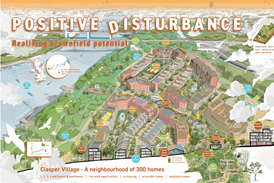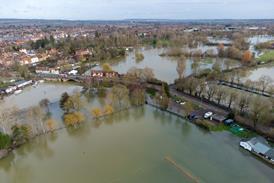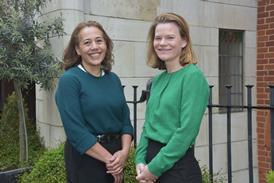Briefing – Page 17
-
 Features
FeaturesBeauty is in the eyes of the beholders
What happens when a community have different ideas about what their local design code should say, ask Nisha Kurian and Holly Lewis
-
 Features
FeaturesExplainer: How the proposed Future Buildings Standard will affect the way you design
Thomas Lane highlights the most important points in the government’s long-awaited proposals to make non-domestic buildings greener
-
 Features
FeaturesOpening a new chapter in the history of the urban
As we reimagine our material and social infrastructure post-pandemic we could learn from cities that have been through worse, argues Clare Melhuish
-
 Features
FeaturesExplainer: Five things you need to know about the Future Homes Standard
The government has published the draft version of Part L which comes into force next year. We outline what it means for the industry
-
 Features
FeaturesRunning on empty: Whatever happened to the Nightingales?
The Nightingale hospitals, built in record time, were a proud moment for the industry. But with patient numbers overwhelming the NHS, Elizabeth Hopkirk asks why they never fulfilled their original promise
-
 Features
FeaturesWhat the Brexit deal means for architects
RIBA’s Lucy Monks unpacks how the future-relationship agreement will change everything for the profession, from visiting clients to recognition of qualifications
-
 Features
FeaturesScrapping Erasmus is a tragedy for the next generation of architects
Britain’s exit from the exchange programme has needlessly destroyed something of enormous value, writes Oliver Bayliss
-
 Features
FeaturesMutant algorithm? Call in the superheroes
Development has all gone a bit Marvel, says Danny Crump
-
 Features
FeaturesGrenfell Inquiry explainer: How rival insulation firms covered up fire-safety data
As module two is suspended till next year, Jim Dunton looks at the spotlight it has placed on product manufacturers so far
-
 Features
FeaturesLearning from lockdown: Is there a future for the office?
Covid-19 may have emptied our cities and changed the way some people do their jobs for ever, but reports of the death of the office are premature, writes Dave Rogers
-
 Features
FeaturesBishopsgate Goodsyard is a tonic that will help London recover from covid
The hugely controversial Shoreditch proposals have finally been recommended for planning. This is a good thing for London, argues Eric Parry, one of the architects involved
-
 Features
FeaturesGrenfell Inquiry digest | Module one: How experts blamed key players for ‘shambles’
As the first part of the phase two hearings concludes, Jim Dunton examines the evidence so far and finds a litany of major failures, incompetence and buck-passing
-
 Features
FeaturesImagine a future where we don’t have to choose between economy and ecology
Two pieces of legislation currently heading for the statute books seem to pit the built and unbuilt environments against each other
-
 Features
FeaturesGo wild in the cities to help save the planet
A rewilding policy is not just for rural areas. We should be designing urban environments that safeguard our future, argues Ruth Richardson
-
 Features
FeaturesOffsite manufacturing will encourage more women into the industry
A fixed workplace close to home, flexible shift patterns and job security would all attract women to jobs in construction, Rosa Turner Wood writes
-
 Features
FeaturesRichard Rogers’ greatest legacy is not a building but his activism
As Richard Rogers retires from the practice he founded more than 40 years ago, former colleague Sarah Gaventa considers his legacy
-
 Features
FeaturesLearning from lockdown: Norman Foster on the future of cities
The pandemic could accelerate significant change, the Foster & Partners founder told more than 40 city leaders
-
 Features
FeaturesMy interpreter role: Helping designers and builders speak the same language
Laurence Reilly on his switch from contractors to an architecture practice
-
 Features
FeaturesRadical ideas to improve young people's life chances through better housing
Damien Sharkey explains how HUB's recent design competition set out to defy traditional housing models and help the next generation thrive
-
 Features
FeaturesBrits don’t have the appetite to return to the office, at least not full time
Clients seem divided on what do with their office space, but most think the pandemic will permanently change how and where staff work, says Jack Pringle








